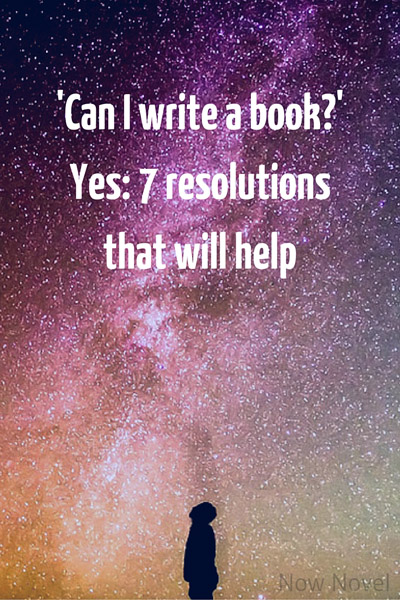The start of a new year is a great time to set goals and start writing in earnest. Try making resolutions, such as these seven:
1. Turn your censor to the wall
Imagine there’s a portrait and the eyes meet the perspective of the viewer, creating the unsettling sensation you are being watched no matter where you stand in the room. Your internal censor is like that portrait. It can loom over your work space, making you pick apart everything you write before you get anywhere. It’s hard to finish a chapter, let alone a novel if your internal censor is watching your every move critically.
Make your first resolution: Turn the censor to face the wall. Give yourself the freedom to write without reproaching yourself. You can always edit a bad page, but you can’t edit a blank one. Free-writing is one exercise that makes it easier to write first and delete later.
2. Give yourself a regular writing time
When we ran a poll on the Now Novel blog, many people said that their biggest obstacle to writing was finding time to just write. Writing may seem a luxury, yet it’s a luxury you will find a way to claim if you are committed to write a novel this year.
Resolve to write at least every second day if you can’t write every day. Remember that there will be days where you write next to nothing. But if you make time regularly – even if that means jotting something down in a notebook while waiting for an appointment – ideas will come quicker. So you’ll need less time as you train your unconscious to give you bits of your story on cue.
3. Create your own rewards scheme
One of the biggest challenges of writing a novel is that it can feel at times as though there is no tangible end in sight. It is a mammoth undertaking. Give yourself regular, reasonable rewards to stay committed. Think of healthy eating plans and ‘cheat days’ or rewards given to pupils in the education system: these create a sense of having earned something satisfying. This earning and unlocking of rewards creates sustained motivation.
Make rewarding yourself a non-negotiable resolution. What does a reward look like? It depends on the milestone it celebrates. Whenever you finish writing a scene, you could:
- Go for a short walk somewhere relaxing
- Enjoy a small, satisfying snack
- Enjoy some mindless entertainment that will help replenish mental energy
- Spend some time away from your notepad/laptop/personal computer seeing friends
For larger milestones, make the reward more significant. Maybe there’s a concert or other event you’ve been excited about for months? Schedule your writing around it and try to finish a chapter of your book in the days before you go. Tell yourself the experience is your reward. Rewards don’t have to be expensive or overly indulgent. But save the biggest pleasures for when you reach the biggest milestones.
4. Plan your story and your writing time smarter
Writing a novel from start to finish involves multiple levels of planning. There’s planning the actual writing process, and planning your story – the plot, character arcs and general shape and structure. When planning your novel:
- Decide what method for outlining a novel works best for you: Try different approaches until you find one that brings results.
- Break your novel up into manageable chunks. The smaller the unit, the less daunting the task.
- Don’t get distracted by ideas and get too detailed at the planning stage – keep the planning process loose and light.
When it comes to planning the writing process itself, the actual time you will spend writing:
- Get a calendar and block out all the time that’s completely off limits for writing (work or school, family commitments and other)
- Pencil in the days and times where you can write and make them total commitments as though they were just as ‘do or die’ as your existing obligations
- Think about what part of your novel you will tackle when: Will you start at the beginning and work to the end chronologically? Is there a definite idea for an end you want to write first? Are there different story arcs you want to write separately before stitching the fragments of the story together?
Once you’ve resolved to plan both your writing process and your story attentively, you’ll find that scenes and even whole chapters fall into place easier.
5. Be brave with feedback
Some writers prefer to only get feedback on a complete manuscript once the first draft is finished, while others prefer to get insight from a book writing coach or writing circle as they go. Whatever you prefer, resolve to be open to feedback from other writers.
When you’re writing a novel you’re so close to the story and the text that awkward phrases, inconsistencies and other small mishaps can go unnoticed. Welcoming feedback – and leaving behind the personal while taking to heart the constructive – will help you grow as a writer. The growing confidence that comes with this feeling of improvement will spur you on to finish writing the book this year.
6. Take breaks whenever you need to
You might need a break if (even during the writing process) you often find yourself asking ‘can I write a book?’ Although discipline and dedication are important for writing a complete novel, it’s equally important to recognize when you need a rest and allow yourself time off. Short breaks as rewards help, but there may also be a time when you need a week or more off.
Don’t be too hard on yourself about putting your story aside for a little while – you’re not giving up, just taking a breather. What’s more, the time spent not writing could be exactly what your subconscious needs to work through parts of the story that aren’t quite making sense, or to discover that one character who will be the perfect foil to your protagonist. Come back to your story before too long so that you do not lose all your momentum.
7. Establish reliable sources of motivation
Some people say that if you’re a writer, you will be motivated naturally. But this simply isn’t so. Maybe you’ll have patches where your character is being coy about motivations, or times where it simply feels like a slog editing your work.
Make an external source of motivation your safety net to ensure that you finish writing a book this year. It could be a writing mentor – someone who holds you accountable to writing goals you set yourself and gives advice when you are facing writer’s block or another challenge. A writing group could also help you stay motivated as you work around shared challenges. Besides resolving to reward yourself consistently for progress, create additional motivation by finding a support structure that keeps you moving forward even when the going gets tough.
How do you plan to achieve your writing goals this year? What is your biggest obstacle at this point in time?



